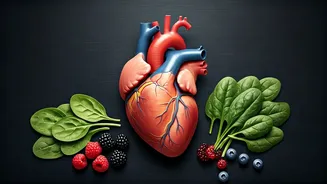Heart-Healthy Foods
Incorporating specific foods into your diet can significantly boost heart health. Fruits and vegetables, rich in vitamins, minerals, and antioxidants,
play a vital role. Berries, for example, are packed with antioxidants, which combat harmful free radicals. Leafy greens, such as spinach and kale, provide essential nutrients like Vitamin K, which supports healthy blood clotting. Whole grains offer fiber, contributing to lower cholesterol levels and reduced risk of heart disease. Oats, in particular, are known for their soluble fiber content. Lean proteins, like fish, especially those rich in omega-3 fatty acids such as salmon, support heart function. Nuts and seeds provide healthy fats that can also contribute to heart well-being, though portion control is key. A balanced diet incorporating these foods forms a solid foundation for a healthy heart.
Beneficial Nighttime Habits
Nighttime habits greatly influence heart health, specifically through their effects on sleep and digestion. Getting adequate sleep allows the body to repair and rejuvenate, impacting overall cardiovascular function. Establish a consistent sleep schedule to regulate your body clock, and aim for 7-9 hours of quality sleep each night. Avoid heavy meals and excessive caffeine before bed, as these can disrupt sleep patterns and negatively impact your cardiovascular system. Creating a relaxing bedtime routine, such as reading or taking a warm bath, prepares the body for sleep. Adequate hydration is important, however, limit fluid intake before bed to avoid nighttime bathroom trips that can disrupt sleep. By paying attention to these habits, individuals can support better digestion, improve sleep quality, and enhance heart health.
Early Warning Signs
Recognizing early warning signs of heart issues is crucial for timely intervention. Chest pain or discomfort, including pressure, squeezing, or a burning sensation, is a major concern. Shortness of breath, especially during physical activity or at rest, can indicate a problem. Unusual fatigue or weakness, even after minimal exertion, may signal heart trouble. Swelling in the ankles, feet, or legs can occur when the heart isn't efficiently pumping blood. Palpitations, or a feeling of a rapid or irregular heartbeat, warrant attention. Dizziness or lightheadedness, along with nausea, can be associated with heart conditions. If you experience these symptoms, consulting a healthcare professional is essential for accurate diagnosis and prompt care. Ignoring these warning signs can have serious consequences.
Heart Attack vs. Arrest
Understanding the difference between a heart attack and cardiac arrest is important for effective response. A heart attack, also known as a myocardial infarction, occurs when blood flow to the heart is blocked, often due to a clot. The primary issue is a reduction of oxygen supply to the heart muscle. Symptoms can include chest pain, shortness of breath, and radiating pain in the arm or jaw. Cardiac arrest, on the other hand, is the abrupt loss of heart function. It happens when the heart's electrical system malfunctions, causing the heart to stop beating effectively. This can be caused by a heart attack or other heart problems. Key symptoms include a sudden loss of consciousness and the absence of a pulse. Both conditions are serious, but cardiac arrest requires immediate treatment, such as CPR and defibrillation. Knowing the distinctions can help in ensuring appropriate and timely action.
Preventive Measures
Proactive measures are key to maintaining a healthy heart. Following a heart-healthy diet rich in fruits, vegetables, whole grains, and lean proteins is fundamental. Regular physical activity, such as brisk walking, running, or swimming, strengthens the cardiovascular system. Aim for at least 150 minutes of moderate-intensity exercise or 75 minutes of vigorous-intensity exercise per week. Controlling blood pressure and cholesterol levels through diet, exercise, and, if needed, medication is essential. Avoiding smoking and limiting alcohol intake are also vital. Managing stress through techniques like meditation or yoga reduces strain on the heart. Regular check-ups with a healthcare provider, including blood pressure and cholesterol screenings, can detect problems early. Taking these steps can significantly lower the risk of heart disease and promote overall health.














